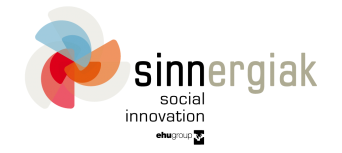 Transcreativa is a European project that is headed by Sinnergiak Social Innovation (University of the Basque Country) and funded by the European Union’s Interreg IV B SUDOE Programme (SOE3/P1/E529). Its aim is to boost the creation of jobs for young people in the cultural and creative industries.
Transcreativa is a European project that is headed by Sinnergiak Social Innovation (University of the Basque Country) and funded by the European Union’s Interreg IV B SUDOE Programme (SOE3/P1/E529). Its aim is to boost the creation of jobs for young people in the cultural and creative industries.
CHALLENGE
Transcreativa has three core objectives:
• To draw attention to the cultural and creative industries and establish them as a key element for the promotion of social cohesion and the economic development of the regions.
• To promote spaces for regional and interregional clustering through the transfer of technology (prototypes), the creation of companies (social entrepreneurship) and interregional connectivity (creative clusters and a virtual HUB).
• To integrate the cultural and creative industries into the social innovation strategies for the development of innovation skills among the young unemployed.
SOLUTIONS
The Transcreativa project is divided into six core activities:
• RESEARCH: Strategically mapping the cultural and creative industries. A research activity whose purpose is to map the regional structure of the cultural and creative industries and develop a three dimensional map of the profile of the sector’s organisations: technological capacities, innovation skills and development strategies.
• INTERVENTION: To develop 3 Creative Clusters (one in each region) which are linked by a cross-regional Virtual Hub. A social intervention activity aimed at meeting three additional objectives.
1. The creation of spaces for competency-based learning to improve the employability and social capital of the young unemployed.
2. To develop pilot experiences for the creation of new organisations in the creative and cultural industries for the young unemployed (technological companies, cooperatives and social enterprises).
3. To organise an area for prototyping and transferring technology to regional companies from the creative and cultural industries.
• TRANSFER: To develop technological prototypes. An activity aimed at transferring technology to companies from the creative and cultural industries, to improve their competitiveness and regional positioning.
• DISSEMINATION: To disseminate the outcomes of the project through various channels: academic articles, reports on regional policies, activity reports, press releases, social networks and regional and cross-regional workshops.
• ESCALATION: To formally establish the project activities as good practices for boosting economic development with social cohesion at a regional level and escalate the core activities to other European regions.
• ASSESSMENT: To assess the activities performed for the project and their impact. Activity geared to developing a monitoring system for the project and the social impact (employability of young people), business impact (creation of new organisations and transfer of technology) and a strategy for escalating the project in other European regions.
EXPECTED OUTCOMES
• To identify the strategic sectors of the cultural and creative industries in each region and their innovative dynamics, technological capacities and development strategies. To prepare 6 academic papers to understand the dynamics of the sector and one paper on public policies for the promotion of the cultural and creative industries in the regions involved in the project.
• To create 3 regional creative clusters and a virtual hub as a space for learning and knowledge transfer to integrate the young unemployed, companies from the cultural and creative industries, public institutions, universities and agents of technology into different practices.
• To develop 6 technological prototypes, involving 90 companies from the cultural and creative industries in this prototyping process and promoting the creation of 12 new organisations that are led by the young unemployed.
• To prepare 3 competency-based training modules (employability) as a learning space for 240 young unemployed people in the three regions involved in the project.
• To develop a strategy to capitalise on the creative clusters and escalate their core activities to other European regions.
PARTNERS
Transcreativa is a European project that is headed by Sinnergiak Social Innovation (University of the Basque Country/Euskal Herriko Unibertsitatea) and funded by the European Union’s Interreg IV B SUDOE Programme (SOE3/P1/E529), with the Capital of Culture Donostia – San Sebastian and Tecnalia also being involved at a regional level, with the cooperation of the European Regions of Aquitaine (France) and Coimbra (Portugal) and the participation of ESTIA Reserche, Agence Pays Basque ANTIC and BEM-KEDGE and the University of Coimbra, the Pedro Nunes Institute and Coimbra City Hall, respectively.
